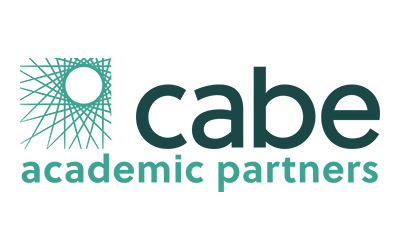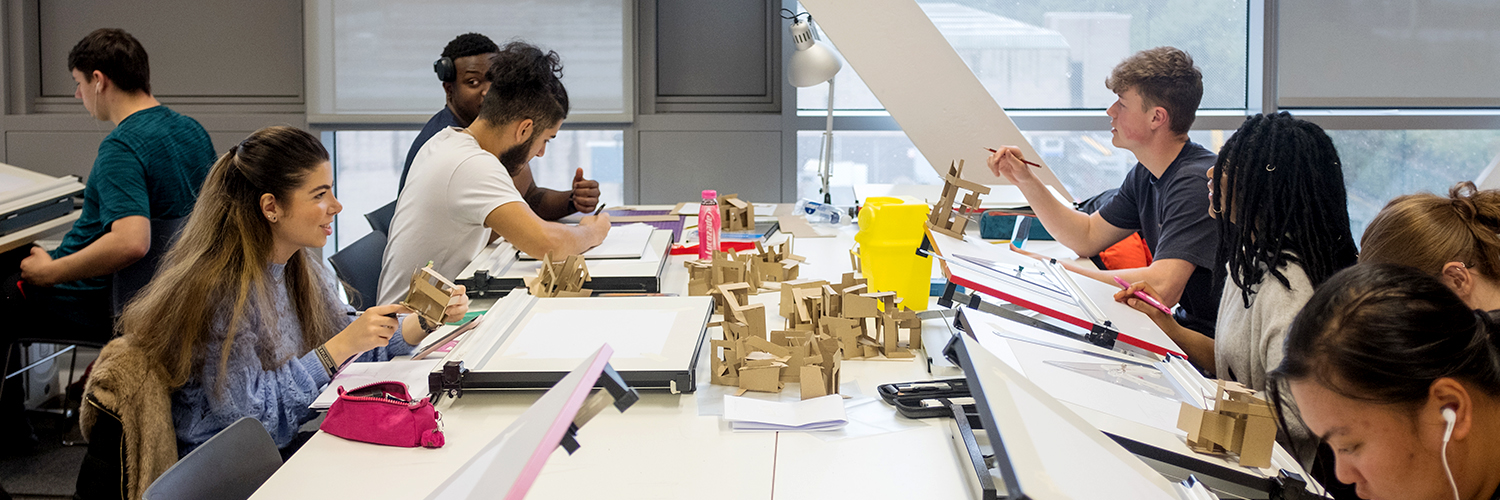Architectural Engineering
Full-time
Three year
September 2025
In a nutshell
Successful architectural design is the sweet spot between technology, science and creativity. As we push design boundaries further, and create buildings that are both sustainable and spectacular, choose to study the engineering brains behind the architectural beauty with our BSc Architectural Engineering degree.
Drawing on our strong industry connections, our Chartered Association of Building Engineers (CABE) accredited course will provide you with a comprehensive perspective of building design from day one. Gain robust knowledge of building structures as you learn about leading a multidisciplinary approach to building design. Experience action-learning as you join a vibrant student community, learning alongside other students from architects, design technologists and the built environment.
Guided by international expert tutors, this course will help you to develop career-focused knowledge and skills. Through live briefs and guest lectures from local architecture, you’ll graduate excited and inspired, ready to help change our built environment for the better.
Unsure about this level of study? We also offer Architectural Engineering with a foundation year entry pathway
Start your study journey
Register for our next Open Day to learn more about studying Architectural Engineering, explore our facilities and meet the course team
You will:
- Explore interactions between a building and its internal and external environments, and the relationships between shape, material, performance, load, and construction
- Understand the role of nature, people and technology in design, alongside the economic and environmental dimensions that impact on the building design process
- Be part of a vibrant multidisciplinary learning environment, working with students from other built environment disciplines, including architects, architectural design technologists, building surveyors, construction managers and quantity surveyors
- Develop key skills required by an architecture professional, including project appraisal, team working, critical analysis and problem-solving
students accepted
Course accreditations


This is for you if...
You're fascinated by the design of buildings, and you are curious to explore cities, urban life
You have a passion in innovative architectural structures and want to explore and learn further
You are interested in highly imaginative and creative skills and have a passion for technical exploration
You want to be part of a vibrant learning environment and work with students from other built environment disciplines
You have ambitions to become an architectural engineer and want to start your journey towards professional status
All about the course
Course Delivery
The course is delivered full-time over three years, you will study a carefully-designed suite of modules which blend architecture and engineering disciplines. As you learn about structural principles, you will explore architecture theory, developing design awareness and an understanding of integral systems.
Our range of modules will introduce you to the architectural design processes in year one, and you’ll begin to use sophisticated software to develop your design skills and learn how to manage design information by year two. In your final year, you’ll continue to develop a design portfolio and complete a final project of your choice where you can present to industry experts
Learning Experience
Through our enviable location at the heart of Greater Manchester, our expert academic team draw on close industry links with architecture, engineering and construction sectors, to bring you guest lectures, professional networking opportunities and local architectural projects that will support your knowledge and skill progression.
During year one of your studies, the Architectural Design, Architectural Engineering and Construction Technology, modules will introduce you to architectural design, structural performance, and manufacturing technologies. You’ll study in an inspiring, engaging way, so that you are prepared for real world challenges once you start your exciting career. The History and Theory module will introduce you to architectural history and theory, architectural heritage and cultural context and critically examines its relevance to the practicing architect today. During Year two Design studio module comprises the further development and formation of an iterative architectural design methodology. In the Construction Technology and Architectural Engineering Modules you will develop your ability to select and apply structural assemblies, stability systems and construction details, and develop your understanding of technological innovation in architecture. The
Multidisciplinary project will allow you to engage in a multidisciplinary practiced-based environment and gain an insight into industrial practice with other disciplines. During year three, in the Design module you will develop, apply and test your design skills in the context of complex design projects. In the Architectural Engineering Module you will develop the ability to propose structural schemes, learn to apply risk assessment and understand the effects of accidental loading. The Practice Management and Law Module prepares you for your first year industry, equip you with a comprehensive understanding of the profession.
Based at our green Peel Park campus, you will thrive in our dynamic studio environment. There’ll be plenty of opportunities to tackle real life creative project briefs, sketch ideas and make models, as you fill your Instagram feed with impressive local architecture. As a student at Salford, you’ll also showcase your design skills at our annual Degree show so you will receive an immersive, rewarding learning experience
Architectural Engineering 1
This module introduces you to the fundamentals of structures. You will learn about the forces acting upon structures and how these are analysed. You will be introduced to different material properties used in various methods of construction, and you will be able to calculate the performance of simple structural elements. Sketching and calculations are an important part of the module.
Design Studio 1A
You will be introduced to architectural thinking and the implications of the relationships between people, environment and place through creative and engaging small-scale design projects. Through the projects you will practice a wide range of architectural representation techniques, from orthographic drawing to model making.
Design Studio 1B
You will develop your skills and knowledge in architectural representation and build design through larger scale design projects and live engagement opportunities.
Design Technology 1
This module introduces you to construction technology, systems and services by focusing on principles of structures, construction assemblies, techniques and sustainable design of domestic architecture. Within the context of the climate emergency you will explore the fundamental approaches to construction used to achieve safe, environmentally sound tectonic strategies. The module will discuss building physics and the building’s fabric, and how its environmental services and systems need to be combined to provide physiological, thermal, visual and acoustic comfort.
History and Theory 1
You will be introduced to the canon of western architectural history and its underlying ideological assumptions. The module locates the major practices and sites of western architecture in a wide visual, cultural and ideological context and critically examines its relevance to the practicing architect today.
Design Studio 2A
This module explores the use of architectural representation to analyse and critique urban contexts and develop contextually appropriate design propositions.
Interior Architecture Design Studio 2B
This module enhances your prior learning and develops the opportunity to enter a national or international design competition alongside the development of a personal interior architecture design brief. Exploring interior typologies, the module aims to develop your creative potential within a future built environment context. You will extend the design brief(s) to propose innovative new approaches to interior space and extend the ideas and approaches you have explored and developed throughout the programme to date.
Practice 2: Multidisciplinary Project
The multidisciplinary module allows you to engage in a multidisciplinary practice-based environment and gain an insight into industrial practice. Utilising a real-world scenario student’s work collectively and collaboratively to communicate a project solution to a panel of assessors through varying forms of media. This module is supported with a series of industrial guest speakers to offer real life practices, procedures, technologies, and communication techniques.
Architectural Engineering 2
This module requires that you study and critically analyse various examples of design concepts for structures. You are required to analyse the parameters (environmental, structural) that had been taken into consideration to resolve structural issues, such as types of soil/foundations, structural characteristics and properties, construction materials and techniques and aesthetic quality. You will develop a wider understanding and knowledge on various structural systems, properties of construction materials, and methods of construction. You will apply this knowledge on your own design solutions in your design concepts in other modules.
Design Technology 2
This module further develops your understanding of technological innovation in architecture integrating the parallel strands of Structure and Services introduced to you in year 1 through two core themes central to Building Fabric Design: Design for Climate and Sustainability and Design for Human and Life Safety. Through these themes you will develop competencies in more advanced construction techniques, systems and assemblies for non-domestic buildings and through this you will extend and develop your technical vocabulary and grasp of building physics and building fabric design for more complex building forms.
Architectural Engineering 3
This module will introduce you to a holistic approach in the analysis of decision making in the design of advanced, complex and challenging structures. You are required to carry out individual research and consider the following factors: the function of the structure, construction materials and techniques, loads and forces, sustainability and environmental impact of the structure such as embodied energy, life cycle assessment-using sustainability tools, indoor comfort, the structural forms and structural performance, and aesthetics.
You will apply the knowledge to your own design solutions in other modules.
Design Technology 3
This module comprises the development of tectonic rationale and detail design at a variety of scales and levels of detail and the continued formation of an iterative design methodology. It builds on the formation of technical assemblies, structural and environmental rationales and communication of detailed design solutions developed in parallel with a design task of some complexity and asks that you both build upon and challenge accepted performance and evidence-based modes of integrated design whilst seeking compliance with technical standards and regulatory frameworks for sustainability, health and life safety, and delivering a plausible and buildable project.
Integrated Design Studio
This module consolidates your ability to provide architectural solutions to problems and synthesize space to address complex architectural problems of increased complexity. It requires you to apply the principles of architectural design, in a complex urban setting and in response to an architectural brief to provide an integrated building design process.
Practice 3
This module aims to prepare you for your first year in industry by equipping you with a comprehensive understanding of the profession of architecture. You will develop an understanding of the role of the architect in society. You will learn about the management of the construction industry, the role of the architectural practice and responsibilities of each within the regulatory legal context within which architecture operates.
Please note that it may not be possible to deliver the full list of options every year as this will depend on factors such as how many students choose a particular option. Exact modules may also vary in order to keep content current. When accepting your offer of a place to study on this programme, you should be aware that not all optional modules will be running each year. Your tutor will be able to advise you as to the available options on or before the start of the programme. Whilst the University tries to ensure that you are able to undertake your preferred options, it cannot guarantee this.
Frequently Asked Questions
Are Architects and Architectural Engineers the same?
Architects and Architectural Engineers will collaborate closely on the same project since they're both crucial in the process of constructing buildings. An architect communicates with clients to design and create blueprints to their needs, while an architectural engineer is focused on the practical elements of designing and constructing the building and its functional systems based on those blueprints.
Is it hard to study architectural engineering?
Studying architectural engineering can be challenging since it involves many practical aspects and tasks, however, our students find our programmes incredibly rewarding when gaining a wide range of skills during their studies.
There are methods to ensure you’re getting the best of your degree, including practicing good time management and making time for yourself to recharge. If you find your studies overwhelming, there will be support available from your lecturers and university support staff.
What GCSEs and A Levels do you need for architecture?
Most of our Architecture programmes require GCSE English Language and Mathematics at grade C/Level 4 or above and a certain number of UCAS points. The specific entry requirements for this programme can be found in the entry requirements section.
How long does it take to become an architectural engineer?
Our Architecture programmes are delivered on a full-time basis over 3 years (or 4 if a placement year is chosen). Most of our programmes also offer an added foundation year, taking your studies up to 4 years but requiring more relaxed entry requirements.
School of Science, Engineering and Environment
Rising to the challenge of a changing world, our degree courses are designed to shape the next generation of urbanists, scientists, engineers and industry leaders.
Driven by industry, and delivered by supportive programme teams, you can develop the knowledge and skills to become unstoppable in your career.
Facilities
As an Architectural Engineering student, you will experience a modern learning environment, enriched with accessible lecture theatres and AV-equipped classrooms, computing suites and multimedia libraries, with access to industry journals, databases and simulation software.
You will be based in our architecture studios, designed to inspire you to develop ideas and collaborate. You'll also have access to workshops that feature laser cutters and 3-D printers, to help you bring your ideas, models and concepts to life.
Industry Collaboration
When you start this degree with Salford, you are also joining a community making a difference in industry, our local region and in our wider society.
Many of our academics and technicians who support your course also deliver collaborative, interdisciplinary, high-impact work in a range of local and global built environment issues and challenges.
Discover how you are part of something bigger.
What about after uni?
EMPLOYMENT
This course is designed to help you to develop a range of personal and professional skills which will make you highly employable. These include report writing and presentation skills, IT skills and team work and project management skills.
By successfully completing an architectural engineering degree, a wide range of exciting career opportunities will be open to you. By knowing how to the apply engineering principles and technology to building design, you can use these skills to build a successful career.
Architectural engineering graduates are in demand because of the importance placed on the design, construction and operation of sustainable buildings. Typical employers include architectural practices, central government, local authorities, property developers and construction contractors such as MHA Architects, Walker Simpson Architects, and Mason Gillibrand Architects
FURTHER STUDY
If you decide to take your studies further, we offer a range of related postgraduate built environment courses. Salford graduates and alumni will also receive a generous fees discount.
MSc Project Management in Construction
MSc BIM and Digital Built Environments
MSc Real Estate and Property Management
Career Links
Bursaries for BSc (Hons) Architectural Engineering in 2023-24
In 2023-24, our alumni and industry offered a few bursaries to our year 1 students in the construction industry, engineering and STEM courses.
First year students were awarded the following four scholarships:
1) Three scholarships from Barratt Developments Sustainable Housing: £3,000 (for year 1)
2) One scholarship from GHD Foundation Scholarship: £10,000 (for years 1-3)
What you need to know
APPLICANT PROFILE
In addition to our academic entry requirements, we also look for certain characteristics in each applicant. Having these characteristics will not only help you to fulfil your academic potential, but they are also essential if you want a successful built environment career.
ENGLISH LANGUAGE REQUIREMENTS
All of our courses are taught and assessed in English. If English is not your first language, you must meet our minimum English language entry requirements. An IELTS score of 6.0 (no element below 5.5) is proof of this, and we also accept a range of equivalent qualifications.
Read more about our English language requirements, including information about pathways that can help you gain entry on to our degree courses. If you do not have the English language requirements, you could take our Pre-Sessional English course, or the International Foundation Year to gain entry onto this degree.
ADDITIONAL ENTRY REQUIREMENTS
All candidates must submit a portfolio. Letters of verification confirming that the portfolio is your own work must accompany the portfolio. For example, the letter can use school/college headed paper and be signed by your tutor. For mature students, the letter should be written and signed by someone with an industry connection.
Please read our guidance for portfolio preparation and submission. Your portfolio must be sent to the Admissions Team: admissionsSEE-UG@salford.ac.uk
GCSE
English Language and Mathematics at grade C/level 4 or above (or equivalent). You must fulfil our GCSE entry requirements as well as one of the requirements listed below.
UCAS tariff points
112 UCAS points
A Level
112 UCAS points
BTEC National Diploma
DMM in a related discipline
BTEC Higher National Diploma
Please contact Admissions for further information.
T level
You will need 120 points plus a portfolio
Access to HE
112 UCAS points
Foundation Degree
Please contact Admissions for further information.
European Baccalaureate
Please contact Admissions for further information.
Other Qualifications
Please contact Admissions for further information.
International students
We accept qualifications from all around the world. Find your country to see a full list of entry requirements. If you do not have the English language requirements, you could take the International Foundation Year to gain entry onto this degree.
Salford Alternative Entry Scheme (SAES)
We positively welcome applications from students who may not meet the stated entry criteria but who can demonstrate their ability to successfully pursue a programme of study in higher education. Students who do not have the traditional entry requirements may be able to apply through the Salford Alternative Entry Scheme. Support in preparing for the written assessment is available from the University.
English Language Requirements
All of our courses are taught and assessed in English. If English is not your first language, you must meet our minimum English language entry requirements. An IELTS score of 6.0 (no element below 5.5) is proof of this, and we also accept a range of equivalent qualifications.
Read more about our English language requirements, including information about pathways that can help you gain entry on to our degree courses. If you do not have the English language requirements, you could take our Pre-Sessional English course, or the International Foundation Year to gain entry onto this degree.
How much?
Your tuition fees are regulated by the UK government who has proposed changes to tuition fees for UK students studying in England from 1 August 2025. The fee stated reflects this proposed change, but remains subject to parliamentary approval. Your tuition fees may increase in your first and each subsequent year of your programme to the maximum amount permitted by UK law or regulation for that academic year.
| Type of study | Year | Fees |
|---|---|---|
| Full-time home | 2025/26 | £9,535.00per year |
| Full-time international | 2025/26 | £17,650.00per year |
Additional costs
You should consider further costs which may include books, stationery, printing, binding and general subsistence on trips and visits.
International student scholarships
If you are a high-achieving international student, you may be eligible for one of our scholarships.
Learn more about our latest international scholarships.


